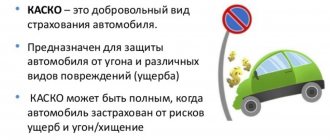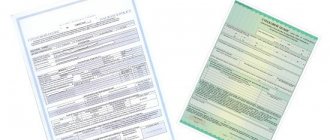An accident can happen to every car owner, regardless of his experience and knowledge of traffic rules. In the event of an accident, the injured party can demand full compensation from the insurance company.
According to the law, a citizen of the Russian Federation does not have the right to drive a vehicle without an appropriate insurance policy. In addition, such cars are not subject to state registration; if the law is violated, an administrative fine will be levied on the perpetrator. Compliance with insurance conditions is controlled by government agencies and legislative documents.
Despite this, litigation quite often arises with insurance companies (IC) regarding compensation for losses.
What laws does the court follow?
Current regulations on compulsory motor liability insurance:
- Constitution of the Russian Federation.
- Federal Law No. 40-FZ of 2002 on compulsory insurance of car owners.
- Law No. 223-FZ of 2014, which spells out amendments to the previous law.
- Law on the protection of consumer rights N 2300-1.
- Regulations of the Central Bank of 2014 N 432-P on a unified methodology for calculating restoration repairs.
- Rules of technical examination N 433-P, approved by the Central Bank in 2014.
Refusal of insurance compensation
Situations often occur when insurance companies completely refuse to pay compensation under compulsory motor liability insurance. The insurance company may refuse to pay if:
- The complete set of documents is not provided, or the documents contain errors. For example, when registering an accident, the traffic police inspector incorrectly indicated the insurance policy number.
- The second participant in the accident has a fake insurance policy. In this case, you must apply for compensation for damage directly to the culprit of the accident, here you also need to go to court, but these legal relations already go beyond the scope of auto liability insurance. In this case, the insurer has the responsibility to prove that the policy is fake.
- The insurance policy has expired. If the car owner did not take care of extending the insurance on time, then he must compensate for the damage in the accident himself. But recently there have been cases of fraud on the part of insurance agents: the client pays for a policy for a year, and the agent transfers data and money as if for insurance for a short period, for example, twenty days. When going to court, the car owner can prove that he purchased a policy for a year by presenting the policy itself and a receipt for payment of the insurance premium for the year. For the court, this is quite enough to recover insurance compensation under a compulsory insurance contract, since the insurance company is responsible for the unlawful actions of its employees.
- Invalidity of the policy due to its loss by the insurer. Some insurance companies refuse to pay, citing the fact that the presented policy was lost by the insurance agent. In this case, if the insurer does not document the fact of loss of the policy, then it is obliged to make a payment. For the car owner, it is enough only to present a receipt for payment of the insurance premium certified by the insurer’s seal.
- Self-repair of a damaged vehicle prior to inspection by an insurance company appraiser. In such a situation, you can receive an insurance payment only after going to court, the outcome of which largely depends on the circumstances under which the repairs were carried out. Firstly, if the car owner himself repaired the car and then presented it to the appraiser with documents for repair attached, then the burden of proving the damage received in the accident falls on him. As practice shows, the court will make a positive decision only if there is sufficient evidence of damage to the car and subsequent repairs. Secondly, the repairs were carried out after contacting the insurer, but the insurer did not assess the damage within the time limits established by law. In such a situation, the court is clearly on the side of the car owner and almost always satisfies the claims in full.
- Link to the results of the traceological examination. The insurer, with the help of a specialist, establishes the circumstances of the accident in order to exclude fraudulent actions on the part of the insured. To refuse payment, it is enough for him to obtain an expert’s opinion that the circumstances of the accident cannot be established, for example, there is no opportunity to inspect the cars of other participants in the incident. Judicial practice in challenging refusals to pay on this basis is entirely on the side of the policyholder, since most such examinations are easily appealed.
- The vehicle was not damaged as a result of movement. For example, the insurance company refused to pay compensation for damage, citing the fact that citizen K.’s car was parked on the lawn, where it was hit by a truck belonging to G.. K. filed a lawsuit demanding that the refusal of insurance payment be declared illegal and oblige to pay insurance compensation in the amount of 63,400 rubles. The court, citing documents from the traffic police confirming the fact of the traffic accident, satisfied the claims in full. Moreover, in this situation, it does not matter how this or that car was damaged. For example, as a result of a collision, a tree fell on a car, this fact is documented as an accident, therefore, there should be compensation under compulsory motor liability insurance.
These are the main reasons for refusal of insurance payment under compulsory motor liability insurance, but in each specific case other grounds for refusal are also possible. Current law enforcement practice shows that most refusals to pay do not have serious justifications, therefore, with competent participation in the judicial process, challenging such refusals does not seem problematic.
Advice: in case of refusal of insurance payment, the claim must be sent to the insurer immediately after receiving the decision of the insurance company. This will significantly reduce the time to resolve the dispute.
Civil liability insurance for vehicle owners is an effective means of quickly regulating most road conflicts. However, the stated goals can only be achieved with strict compliance with the current legislation by all participants in insurance legal relations. Insurance companies do not always act lawfully, and even fines from supervisory authorities do not eliminate violations in their work. Protecting your rights in these legal relations in the courts is justified and allows you to achieve the goal of compulsory motor liability insurance stated by the legislator. The accumulated judicial practice on motor third party liability insurance contracts contains examples of the application of legislation in this area in a variety of situations, which makes it possible to quickly resolve the most confusing issue regarding compulsory motor liability insurance.
General provisions
When taking out a policy, an agreement is signed between the policyholder and the car owner, which specifies possible insured events. It also spells out those situations when the insurance company disclaims all responsibility. Why then does there exist judicial practice on compulsory motor liability insurance?
The fact is that the court more often comes to the defense of the injured party and makes decisions without taking into account the terms of the contract. As a result, insurers pay compensation in full. In addition, the number of scammers who hire lawyers and receive compensation from the insurance company that is not due to them has increased. In this case, victims are left without money or receive a minimum amount.
Given this problem, the Supreme Court made a number of changes to the legislation. Now the trial is carried out only after the citizen personally submits an application to the relevant authority. The payment is made not to the intermediary, but to the injured person. This allowed us to minimize the number of fraudulent cases.
Most often, all disagreements between the insurance company and the policyholder are resolved by agreement, without the involvement of judicial authorities.
If payment under compulsory motor liability insurance is delayed for more than 20 days, the insurance company pays a penalty of 1%. If the insurance company violates the deadline for issuing a refusal, it will be assessed a fine of 0.05%. Penalties come into force 21 days after the client delivers the documents to the company.
Another working method of compensation without taking into account wear and tear
This is an old method if you don’t already know about it.
The fact is that the victim of an accident has the right to expect the car to be restored to its pre-accident condition. What to do if the insurer has calculated the payment taking into account wear and tear on legal grounds?
This is where Article 1072 of the Civil Code of the Russian Federation comes into play. It directly states that if there is not enough money from the insurance payment to restore the property of the victim, then the rest is obligated to compensate the causer of harm - that is, the culprit of the accident.
The Court of Cassation once made the same conclusion, and it was followed by quite successful judicial practice to recover the difference between the insurance company’s calculations taking into account wear and tear and without taking it into account from the perpetrators of accidents.
You can read in detail about the collection procedure, in which cases it is possible and when it is not, and how to act correctly for these purposes in our separate article.
What questions can you bring to court as a plaintiff under compulsory motor liability insurance?
- The compensation awarded by the Insurance Company does not correspond to the losses incurred. If the amount of damage exceeds the assigned payment amount, an independent examination should be carried out and its results should be applied to the court.
- The insurance company delays making a decision, does not pay the amount due on time, or only partially repays losses.
- The insurer refused the claim; for example, it did not consider the accident an insured event. Illegal actions of the company are a violation of consumer rights.
- The amount of damage is much higher than what is allowed under insurance. In this case, the difference is collected from the culprit of the incident in court.
In addition, policyholders go to court for other reasons:
- reimbursement of treatment costs;
- compensation for moral damage if it is proven that the victim suffered a neurological disease or psychological trauma;
- payment for notary and car lawyer services;
- refund of funds for examination and state duty;
- reimbursement of expenses incurred during the evacuation and storage of a damaged vehicle;
- other court-related costs.
If the victim does not submit an application to the Investigative Committee within the prescribed period, he can also appeal to the court. According to the law, the statute of limitations for claims for compensation due is 3 years. However, lawyers advise submitting documents as early as possible. Otherwise, the insurer may refuse to pay, citing violation of deadlines on the part of the plaintiff.
Note! The MTPL law does not provide for monetary payments to those responsible for the accident. Before filing a claim, a citizen must notify the insurance company of his disagreement with the assigned amount of payments. Without this condition, the court will not consider the case. It is advisable to resolve all disagreements out of court.
Important change in judicial practice in 2021
So, at the beginning of 2021, the same Supreme Court of the Russian Federation issued a fateful Ruling under number 86-KG20-8-K2.
In it, the court examined an event where the insurance company Rosgosstrakh refused to compensate the driver of the car due to the suspicion that the damage was not received in this or not only in this incident. As a result, the car owner was forced to repair the car himself. But along the way, he went to court for damages.
But the point is different. The driver ordered an independent examination to calculate the damage, where they calculated 2 amounts: with and without wear and tear. Several courts supported the driver's claim. Moreover, they ordered the insurance company to pay the victim money without taking into account depreciation.
However, the cassation court changed the amount of compensation, awarding the amount taking into account depreciation. And this, it would seem, is quite logical, because ultimately the victim was paid in money under compulsory motor liability insurance, and not in repairs! And above we indicated that it is during payment that depreciation is taken into account. But the Supreme Court did not agree with this situation.
And that's what it's all about! Since we are talking about civil legal relations, the Civil Code of Russia comes into play here. It has Article 393, which literally says that as a result of compensation for loss, the victim must be put in the position in which he would have been before the damage was caused in our case.
It was this norm that the Supreme Court referred to in its new Determination.
That is, the insurer was obliged to issue a referral for repairs, but refused compensation. And then, when the court found him wrong in refusing, he paid in money.
The Supreme Court determined that since the insurance company’s original obligation was to send the car for repairs, the calculation should not take into account wear and tear. On what basis the insurer made the payment is not clear to the court, since there were no grounds for this (from paragraph 16.1 of the law).
Therefore, even with this method of compensation for damage, the calculation must also be made without depreciation, because, according to Article 393 of the Civil Code of the Russian Federation, the victim must be put in the position in which he should have been with proper compensation for damage.
Here is the official interpretation from the definition.
Considering that the fact that the damage to the plaintiff’s car did not correspond to the circumstances of the traffic accident under investigation was not confirmed, the courts came to the conclusion that PJSC IC Rosgosstrakh, in violation of the requirements of the Law on Compulsory Motor Liability Insurance, did not fulfill its obligation to organize the restoration of the damaged vehicle, in connection with which the victim must compensate the cost of such repairs without taking into account the wear and tear of components (parts, assemblies, assemblies).
The courts have not established the circumstances under which the insurance company had the right to replace the organization and payment for restoration repairs with an insurance payment without the consent of the victim. Recognizing these conclusions of the lower courts as erroneous, the judicial panel for civil cases of the Second Cassation Court of General Jurisdiction did not take into account the rule enshrined in paragraph 1 of Article 393 of the Civil Code of the Russian Federation, according to which in legal relations of obligations the debtor must compensate the creditor for losses caused by non-fulfillment or improper fulfillment of the obligation.
What should you know before going to court?
An insured event occurs when an insurance company client is involved in an accident. According to the new rules, the victim must present to the insurer within 5 days documents confirming his rights to compensation. You can contact your insurance company or the insurance company of the person responsible for the incident.
If an individual was injured in an accident, he should ask for help in a court of general jurisdiction; entrepreneurs should file claims with arbitration authorities.
List of documents for submission to the Investigative Committee:
- application addressed to the head of the insurance company;
- policyholder's identity card;
- passport of the damaged car;
- accident report signed by traffic police officers;
- inspection report of the damaged vehicle;
- checks for other cash expenses.
You can contact your insurer if only 2 cars were damaged in the accident, no significant harm was caused to health, and both car owners have an MTPL policy. In all other cases, you need to submit an application to the insurance company that issued the policy to the person responsible for the accident.
The plaintiff in court must present documents proving the illegal actions of the Investigative Committee. First of all, you should attach the insurer's response, which states the reason for the refusal. You also need an act of acceptance and transfer of documents to the insurance company, which indicates the date of application. An independent expert’s decision is necessary in order to prove the underestimation of the amount of payment by the insured. Other evidence may be required, for example, witness statements or video recording.
Insurance payment under compulsory motor liability insurance. Procedure, terms, claims. Arbitrage practice
It should also be taken into account that instead of the expired OSAGO Insurance Rules, approved by the Government of the Russian Federation, the OSAGO Rules, approved, are currently in force. Bank of Russia.
This review of judicial practice has been adjusted taking into account current legislation and current judicial practice, in particular, the articles provide links to the following documents:
- Federal Law of April 25, 2002 N 40-FZ “On compulsory civil liability insurance of vehicle owners” (the law on compulsory motor vehicle liability insurance) in its current version;
- Rules for compulsory civil liability insurance of vehicle owners, approved by Bank of Russia Regulations dated September 19, 2014 N 431-P “On the rules for compulsory civil liability insurance for vehicle owners”;
- Resolution of the Plenum of the Supreme Court of the Russian Federation dated January 29, 2015 No. 2 “On the application by courts of legislation on compulsory insurance of civil liability of vehicle owners” has become invalid
- Resolution of the Plenum of the Supreme Court of the Russian Federation dated December 26, 2017 N 58 “On the application by courts of the legislation on compulsory insurance of civil liability of vehicle owners.”
Sample statements of claim on the topic:
- Statements of claim for recovery of insurance compensation under compulsory motor liability insurance
- Claims for compensation for damage caused as a result of an accident
Who is the proper defendant in the case: the insurer, the owner of the vehicle, the driver, the RCA?
Who is the defendant in a claim for compensation for damages in an accident if the culprit is an employee of the organization?
Who will be the defendant in a claim for compensation for damage caused in an accident if the culprit is the driver, is an employee of the organization and has insurance under compulsory motor liability insurance?
Not included in the MTPL policy, will the insurance pay?
He violated the traffic rules and, as a result of a collision with a vehicle in front, caused harm to the victim in the form of damage to the car's bumper. I drove the vehicle legally - by proxy, I have a compulsory motor liability insurance policy, however, I am not included there as a person authorized to drive. Will the insurance company pay the victim or will the victim collect damages from me?
A claim for compensation for damage from a road accident against the insurer under compulsory motor liability insurance or against the tortfeasor?
I am a defendant in a case for compensation for damage to health and property of a citizen caused as a result of an accident. The risk of my civil liability as the owner of the vehicle is insured, however, the plaintiff, the victim, for some reason wants to recover the damage caused to him from me, he does not declare the involvement of the insurance company as a co-defendant. Does the court have the right to recover all damages only from me?
Who pays for damages in an accident if a third party takes possession of the car?
In what case is it considered that a person was driving a car without legal grounds and therefore was not the legal owner at the time of the accident? Who is responsible in this case for the damage caused, should the insurance company make the insurance payment? What if the car was taken over by a drunken acquaintance who, while I was sleeping, secretly took the keys to my car and caused an accident with it. Who is responsible for the damage caused in this case?
How to understand the phrase “the person did not have the right to drive a vehicle”?
Lack of a power of attorney or lack of a driver's license...
Insurance payment under compulsory motor liability insurance if the driver's license has expired
If I do not have the right to drive a vehicle (my driver's license has expired), but I have a power of attorney from the owner to drive the car, am I considered the legal owner of this vehicle and can the insurance company collect insurance payment from me as the tortfeasor? in the amount of the insurance payment made to the victim?
If the damage was compensated by the culprit in the accident, will the MTPL insurer compensate for the losses?
Can I, as the culprit of the accident, myself compensate for the damage caused to the victim, and then apply to the insurance company for reimbursement of the money paid to me?
Actions of the insurer and the policyholder upon the occurrence of an insured event. Insurer's liability - penalty for violation of payment terms
Sale, repair of a car before obtaining insurance under MTPL
I got into an accident and another driver was found to be at fault. I'm going to sell my damaged car. Can I do this before receiving MTPL insurance? If I sell a car, will they refuse to pay me on the grounds that since the car has already been sold, then no harm has been caused to me?
The insurer does not pay insurance compensation under MTPL
My vehicle was damaged in an accident. I contacted the insurance company of the person responsible for the accident, received a referral to assess the damage, an inspection and assessment was carried out, but they did not pay me. Should I go to court or are there other ways to solve the problem?
Partial refusal to pay insurance compensation under MTPL
I contacted the insurance company with an application for payment of insurance compensation to me (OSAGO). The damage has been assessed. From the expert’s (appraiser’s) conclusion it follows that an amount of 30,000 rubles is payable, however, the insurer paid only 15,000 rubles, citing the fact that some of the spare parts specified in the expert’s conclusion are cheaper and the hours of work to repair the damaged car are inflated. Are such actions of the insurance company legal?
Maximum payment under compulsory motor liability insurance in case of an accident in 2021, liability limit
Penalty for violation by the insurer of the deadline for considering an application for insurance payment
Calculation of penalties under compulsory motor liability insurance: from the insured amount or from the insurance compensation? The insurance company did not make the insurance payment on time. What amount should the penalty be calculated from - based on the specific amount of damage or based on the maximum amount of the insured amount by type of compensation, i.e. out of 120,000 rubles and 160,000, respectively?
- Period of time for insurance payment under compulsory motor liability insurance
- Penalty in case of refusal of insurance payment under MTPL
- Penalty under compulsory motor liability insurance for delay or refusal of insurance payment. Arbitrage practice
- How to calculate the penalty under compulsory motor liability insurance: on the amount of payment or on the insured amount by type of compensation?
- Collection of penalties under compulsory motor liability insurance from the insured amount and from the insurance payment. Arbitrage practice
- Calculation of penalties under compulsory motor liability insurance in judicial practice. Division by 360
- Formula for calculating penalties (penalties) under compulsory motor liability insurance
Direct indemnity
Direct compensation for losses under the MTPL agreement
Under what conditions can I apply for payment of insurance compensation to the insurance company that insures the risk of my civil liability?
Amount of insurance payment. Damage assessment
Amount of insurance payment under compulsory motor liability insurance
In what amount should the insurance payment be made in case of damage to the victim’s property?
TCB
Loss of commercial value (TCV) of the car. Collection, judicial practice
Is the loss of the marketable value of the car considered real damage or lost profit? Is it payable by the insurer, what is the court practice?
Useful leftovers
Valid balances for compulsory motor liability insurance. Arbitrage practice
As a result of the accident, my car was significantly damaged and therefore had to be scrapped. I contacted the insurance company that insured the risk of liability of the person responsible for the accident, and submitted all the necessary documents. As a result, they told me that they would make the insurance payment minus the remaining balance. Does the insurance company have the right to take into account these good balances, what should I do with these balances, can I provide them to the insurer, since I don’t need them?
Insurance payments in case of harm to the life of the victim, compensation for damage caused by the death of the breadwinner
Amount of insurance payment under compulsory motor liability insurance for the death of a breadwinner in an accident
Who is entitled to receive insurance compensation for damage caused by the death of a breadwinner? What is the amount of the insurance payment?
List of documents for insurance payment under compulsory motor liability insurance in the event of the death of the breadwinner
What documents must be provided to the insurer to receive insurance payment for damages resulting from the death of the breadwinner?
Insurance payment under OSAGO for the loss of a breadwinner - a pensioner?
As a result of the accident, the husband died; the driver of the car that caused the collision was found to be at fault. The insurance company of the culprit of the accident, where his auto liability is insured, refuses to pay the insurance, citing the fact that the husband was a pensioner and he could not be my breadwinner. Is this position legitimate?
Insurance compensation under MTPL for the death of a breadwinner - monthly payments
The husband, who was the sole breadwinner, died in an accident. The insurance company said that I could only qualify for monthly payments, but they refused to issue the entire insurance amount. Are the insurer's actions legal?
Insurance payments in case of harm to the victim's health
Insurance payment under compulsory motor liability insurance for lost earnings of a victim in an accident
As a result of the accident, my health was damaged. The second participant in the traffic accident was found guilty of violating traffic rules. Due to the injuries I received, I was in treatment for some time and could not go to work. I contacted the insurance company that insured the liability of the person responsible for the accident with a request to pay me my lost earnings, but I was refused due to the fact that I was paid temporary disability benefits and I do not have a medical examination report on the degree of loss of professional ability. Is the refusal legal?
Amount of compensation for moral damage in case of injury to health in an accident
What amount of compensation for moral damage am I entitled to if I have been seriously injured as a result of an accident? Am I entitled to an insurance payment under the MTPL law?
Compensation payment for compensation for harm caused to the life or health of the victim and the Russian Union of Auto Insurers (RUA)
When will RSA (Russian Union of Auto Insurers) compensate for damage from an accident?
In what cases is it necessary to involve the Russian Union of Auto Insurers as a defendant in the case?
RSA payments under compulsory motor liability insurance when the insurer’s license is revoked
I am a victim of an accident. The auto liability of the tortfeasor—the car owner—is insured by an insurance company whose license has already been revoked. Who should pay my insurance?
Administrative liability for the absence of a compulsory motor liability insurance policy
Responsibility for the absence of a compulsory motor liability insurance policy
What is the liability for lack of insurance under compulsory motor liability insurance?
Is the MTPL insurance policy valid for 1 year or another 30 days?
I heard that after the expiration of the MTPL insurance policy, you can drive for another month and the risk of liability is considered insured, and they cannot be held administratively liable for the lack of a policy. This is true?
How long can you drive without an MTPL policy?
Law “On Protection of Consumer Rights” and Law on Compulsory Motor Liability Insurance
OSAGO and the law on consumer protection
Do the provisions of the Law “On the Protection of Consumer Rights” apply to compulsory insurance contracts (MTPL)? In particular, can I be exempt from paying state fees when going to court to collect from the insurance company the insurance payment due to me as a victim?
0
Author of the publication
offline 1 day
GarryB83
0
Comments: 0Publications: 1252Registration: 07/17/2018
What experts can be involved?
Damage assessment is usually carried out by the insurance company itself. As a rule, an expert technician with special training and certification is involved for this purpose. In other cases, it issues a referral for an independent examination.
If the insurer has not assessed the damage, the client has the right to contact another authority and inspect the damaged car on his own.
Advice: It is advisable to contact a car service yourself to determine the wear and tear of the vehicle, since the monetary payment depends on the results of the examination.
Often the amount of damage determined by the insurance company and the independent expert does not coincide. This is grounds for going to court. It may happen that the amount of depreciation of the car exceeds the maximum established in the MTPL policy. The difference is usually recovered from the person at fault.
The victim demands the difference in wear and tear under MTPL - what to do?
Expert opinion
Volkov Alexander Georgievich
Legal consultant with 8 years of experience. Specializes in family law. More than 3 years of experience in drafting contracts.
When an insurance company pays a victim in an accident less than what is due, then this is unfair - no one argues here. But the insurer calculates the amount of payment or the cost of repairs taking into account wear and tear.
If this money is not enough, then the victim in 2021 can recover more money for damage - both from the insurer under compulsory motor liability insurance in certain cases, and directly from the culprit. Is this fair? How and why this is possible, and most importantly, whether such claims are legal, we will examine in this article.
Position of the Supreme Court
In 2021, the Supreme Court on compulsory motor liability insurance issued a review of disputes regarding motor vehicle civil liability. The most significant positions were highlighted:
- The insurer has the right to make direct compensation for losses if the car was damaged in an accident from a direct collision with another vehicle that has insurance.
- All claims from individual entrepreneurs carrying out economic activities on the vehicle are considered through arbitration.
- If disputes arise between the organization that made direct payments to the victim and the company that insured the culprit of the accident, all disagreements must be resolved pre-trial.
- If an application for compensation, penalties and fines is submitted simultaneously, the pre-trial conflict is considered resolved if at least compensation has been paid.
- If the driver drove the vehicle under a power of attorney or a rental agreement, he is not entitled to payment.
Procedural issues in the consideration of disputes under compulsory motor liability insurance
This document once again clarified that disputes under motor third party liability insurance contracts are considered both by courts of general jurisdiction and by arbitration courts. The first - if the car owner is an individual, and the vehicle is used by him exclusively for his own needs. The second is if the applicant is a legal entity or individual entrepreneur.
Since September 1, 2014, a mandatory pre-trial settlement procedure has been in effect for disputes arising from legal relations under MTPL, that is, before going to court, the car owner must send a claim to the insurer in which he can express his disagreement with the decision made by the insurer or require him to perform certain actions. In case of refusal to satisfy the stated requirements, the policyholder has the right to go to court.
Advice: the pre-trial procedure for resolving disputes under compulsory motor liability insurance is mandatory, therefore, when filing a claim in court, you must attach a copy of the previously submitted claim. Otherwise, consideration of the claim will be denied.
Also, the resolution of the Plenum of the RF Armed Forces clarified that insurance companies do not have the right to change the terms of the motor third party liability insurance contract, since this contract is public and its content is strictly regulated by the federal law on compulsory motor liability insurance. Also, insurers cannot refuse to conclude a motor vehicle liability insurance contract. This is indicated both by the requirements of the law on compulsory motor liability insurance and Art. 445 of the Civil Code of the Russian Federation.
We also note that when going to court, a car owner whose rights have been violated has the right to compensate not only for actual damage, but also to demand compensation for moral damage in an accident. In this case, he needs to prove what moral and physical suffering he suffered as a result of the incident. From reviews of judicial practice it follows that in most cases, demands for compensation for moral damage are satisfied by the court, but not in full.
Judicial practice on wear and tear
One of the controversial issues when calculating the amount of compensation payment is the wear and tear of car parts. Insurance companies took into account the degree of wear and tear, which led to a decrease in the final payment amount. This amount did not always cover the repair of the vehicle in full. Even the judicial authorities believed that calculating the cost of parts at new prices was a way to illegally enrich the driver.
The controversy was put to an end by a comment from the Constitutional Court. Insurance companies must calculate the amount of compensation, pay it, and if the amount is not enough, the driver has the right to recover the balance not from the insurance company, but from the person responsible for the accident. You will need to go through all the steps: conduct an examination of the damage and the cost of repairs, submit a pre-trial claim, and then bring a claim to court.
It is worth filing a lawsuit only if you are fully confident that the guilty party will be able to reimburse the costs. Otherwise, the driver will spend a lot of time, effort and money, and it will turn out that there is no way to get the money awarded. In addition, some defendants try to cheat by providing a certificate of low income. This threatens to reduce the payment amount, or “installment plan”.
Legislative links
The main legislative norms for compulsory motor liability insurance, which are referred to during the trial, are:
- Federal Law No. 40 “On Compulsory Motor Liability Insurance” (adopted on April 25, 2002, in the latest adopted version).
- Supreme Court Resolution No. 2, adopted on January 29, 2015. Explains special situations, most common disputes, and explains the Supreme Court's position in various cases.
- Civil legislation (for example, Article 445 of the Civil Code - a company does not have the right to refuse to provide services to a client).
Information for the plaintiff
The following information from federal legislative acts and clarifications of the Armed Forces of the Russian Federation, given in the Review of judicial practice on compulsory motor liability insurance in 2021, will help you orient yourself in developing a strategy of behavior and preparing for a lawsuit:
- Choice of judicial authority. According to the Federal Law “On the Protection of Consumer Rights” of 1992, the insured victim has the right to go to court:
- in the region of your residence;
- at the address of temporary stay;
- at the place where the insurance contract was signed;
- at the place of execution of the agreement.
- Payment of the fee for filing a lawsuit is regulated by tax legislation, and if the amount of claims does not exceed one million rubles, the plaintiff is exempt from expenses (Article 333.36 of the Tax Code, clause 3).
- The maximum amounts of compensation are assigned, according to Federal Law No. 40 (Article 7), within 400 thousand rubles for property damage, and 500 thousand rubles for victims. This procedure also applies to cases of total loss of the vehicle.
- Calculation of compensation taking into account wear of parts is carried out with a maximum degree of wear limited to no more than 50%, in accordance with Article 12, Clause 12 of Federal Law No. 40.
- The maximum period for making payments under the MTPL agreement should not exceed 20 days after filing an application for an insured event. This period is allotted for consideration of the application, making a decision and fulfilling obligations (cash payment or referral for repairs to a car service center). If an application is rejected, the company must provide a reasoned written refusal.
- A delay in the fulfillment of insurance obligations gives the right to collect a 1% penalty for the number of days of final delay (Clause 21, Article 12 of Federal Law No. 40).
- In the review of judicial practice (Q4 2012), question No. 4 explains that when an insurance company’s license is revoked or its liquidation and exclusion from the RSA, the obligations under the previously concluded agreement are fulfilled by the Union of Auto Insurers (RSA). In this case, the rules for carrying out insurance compensation under a compulsory MTPL policy are regulated by the contractor, i.e., RSA in the order of priority of accepted applications. If the funds available to the Union are not sufficient to fulfill the obligations assumed for the insurer, financial responsibility is distributed among the remaining operating companies that have membership in the RSA.
- If harm was caused to a third party as a result of the interaction of sources of danger, the maximum amount of the penalty, determined in accordance with Federal Law No. 40, can be repaid at the expense of both companies that have entered into a civil liability agreement with car owners, including cases where the fault of one of the parties has not been established. This rule is applied on the basis of the clarifications of the Supreme Court of the Russian Federation received in the Review of Judicial Practice (Q2 2012).
- When deciding to file an accident according to a simplified scheme without involving representatives of the State Traffic Inspectorate, the maximum amount of monetary compensation is determined based on the date of signing the insurance contract by both parties and the features of regional application:
- If the Europrotocol is issued by owners of MTPL policies received after August 2, 2014, the limit of funds paid reaches 50 thousand rubles. Due to the standard validity period of compulsory motor liability insurance within one year, this rule is considered basic.
- If the court is considering a claim relating to past insurance periods, they proceed from the established limit of 25 thousand rubles if the policy was purchased in an earlier period.
- The amount of insurance coverage under the Euro Protocol for motorists involved in road accidents in the Moscow region, St. Petersburg and Leningrad region has been increased to 400 thousand rubles. To assign increased payments, the following conditions must be met: there is documentary evidence of the accident, the incident was recorded in photographs and video recordings (the subject of filming is the damage caused and any details of the area related to the insured event). Maximum compensation will also require that the vehicle be equipped with modern navigation systems such as GLONASS. The rules for applying payments are regulated by paragraph 5 of Art. 11.1 Federal Law “On compulsory motor third-party liability insurance”.
Refusal to pay or understatement
The reasons for insurers going to court are often financial conflicts with the insurance company: either the latter refuses to pay compensation at all or underestimates the amount. It is worth distinguishing between legal and illegal reasons for refusal. If the 5-day deadline for contacting the insurance company with a notification about a traffic accident was missed, then only the driver is to blame for the refusal.
No one will accept an application for reimbursement of expenses outside the prescribed period established by law. Another point is that the reasons are illegitimate. Insurance companies can take advantage of their policyholder's ignorance of legal provisions and procedures for assigning payments. In most cases, the conflict can be resolved pre-trial by sending a claim to the manager with the requirements presented.
If the amount was underestimated, then the car owner will have to try to prove the validity of his demand for an increase in the payment amount. You shouldn’t even try to simply write a large amount or ask your auto repairmen you know to inflate it. It is necessary to conduct an independent expert assessment of the damage received, as well as the cost of restoring the vehicle at a service station. Based on the results of the examination, the amount of the claim will be determined.
Remember that in judicial practice there are cases when the driver not only lost the trial, but the court also ordered him to pay the insurance company the costs of this case.
The judge must see that the plaintiff is protecting his legal rights, and not trying to get rich from the situation, while the insurance company has fulfilled all its obligations. The evidence provided for consideration by the court must contain as many supporting documents as possible. This significantly increases the chances of a court ruling in favor of the driver.
In addition to the costs of repairing the vehicle, the plaintiff has the right to demand reimbursement of expenses in the form of: a penalty for each day of delay in payment, costs of legal advice, state fees, penalties in case of failure to respond to a pre-trial claim, costs of an examination, transportation of the car by tow truck, certification of documents notary, as well as other expenses directly related to the traffic accident.
As a rule, applications are accepted for consideration by the court if compensation is underestimated by 10% or more. With a lower percentage of understatement, claims are simply rejected. And it is not profitable for the owner himself to participate in litigation for a couple of thousand, since the costs of the case will be much higher.










